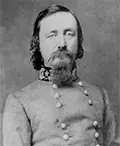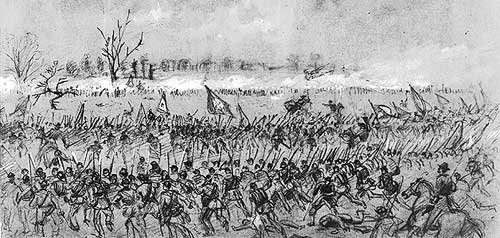Confederate General George Pickett
George Pickett was a Confederate general during the American Civil War. He had command appointments throughout the war but is most well-known for leading "Pickett's Charge," a frontal assault on a heavily fortified position during the Battle of Gettysburg. 
He was born on Jan. 16, 1825, in Richmond, Va. He studied law in Illinois for a time and then gained entry into the U.S. Military Academy, in 1842. After graduating four years later, he fought in the Mexican-American War. He served in Texas and earned a promotion to the rank of captain. He was also assigned to the Washington Territory and became embroiled in the Pig War, a land dispute with the United Kingdom. Also this time, he married Sally Minge, the great-great-grandniece of former President William Henry Harrison. She died during childbirth in 1851; the baby did not survive. The same fate befell his second wife, Morning Mist, whom he married several years later. Hearing of the beginning of the Civil War, Pickett resigned his commission and joined the Confederate army, beginning as a colonel, in charge of the defenses along the Lower Rappahannock River. Appointed a brigadier general in January 1862, he fought against Union troops conducting the Peninsula Campaign. He sustained a shoulder injury at the Battle of Gaines' Mill and, after recovering, was promoted to the rank of major general. He served under James Longstreet at the Battle of Fredericksburg but played little part in that Confederate victory. He next fought in the Suffolk Campaign, targeting a Union garrison in Virginia. He married for a third time, in 1863, to Lasalle Corbell; they had a son who survived. Pickett went with Longstreet on the second northern invasion of overall commander Robert E. Lee and played a pivotal role in the Battle of Gettysburg. On the third day of that historic battle, Pickett gained fame for bravery in the face of terror. At least 150 Confederate artillery opened fire about 1 p.m. Union artillery waited a quarter of an hour, then returned fire but at a lesser rate. After a couple of hours, the Confederate big guns stopped. The Union big guns had stopped before that, to conserve ammunition and to lull the Confederate forces into thinking that no further firing from the Union big guns was possible. 
About 3 p.m., Pickett and his men began what has come to be known as "Pickett's Charge." They marched in formation at first, 12,500 strong, crossing the open ground and aiming to do what their fellow soldiers had not done the day before, seize Cemetery Ridge. When the Union troops arrayed around the open ground opened fire, the "Charge" quickened into a forced march and then a run. As Pickett and his men approached, the Union artillery, which had conserved its ammunition, opened up in a withering barrage. Caught on three sides by enemy fire, the Confederate troops (the ones who weren't killed or wounded) still advanced. Some even reached the walls behind which Union troops crouched. At one location, hand-to-hand combat ensued. But Pickett's force was decimated. Pickett survived, making it back to his own lines, but he didn't bring a whole lot of his men with him. The advance turned into disaster and ended in retreat. Later, when Lee asked Pickett about the state of his division, Pickett replied, "Sir, I have no division." Pickett commanded the Department of Southern Virginia and North Carolina for a time and then was in command of troops at Petersburg. In an attempt to divert Union attention away from that vital railroad junction, Pickett led a force north. Stopped cold at Five Forks on April 1, Pickett could report only that further movement was unlikely. He was particularly embarrassed because he was away at a luncheon when the battle began. Within two days, both Petersburg and Richmond had fallen. Pickett lost his command after another defeat, at Sayler's Creek. His postwar business dealings including farming and selling insurance. He died of a medical ailment in 1875, in Richmond; he was 50. |
|
Social Studies for Kids
copyright 2002–2024
David White




